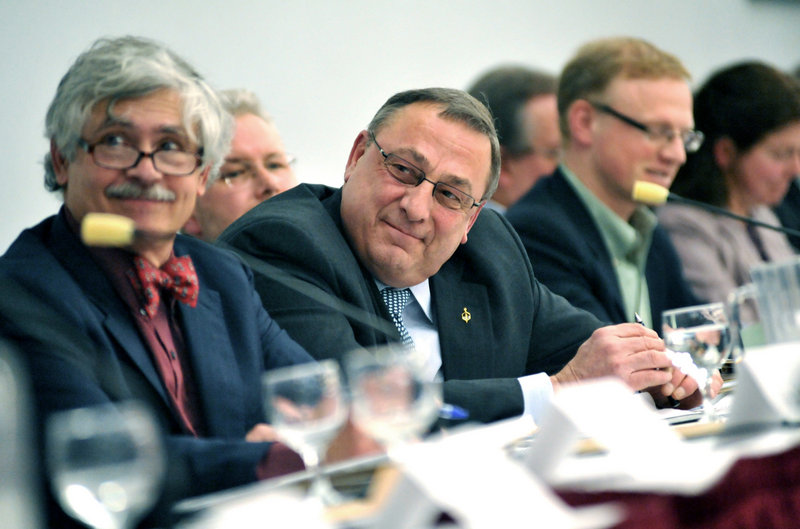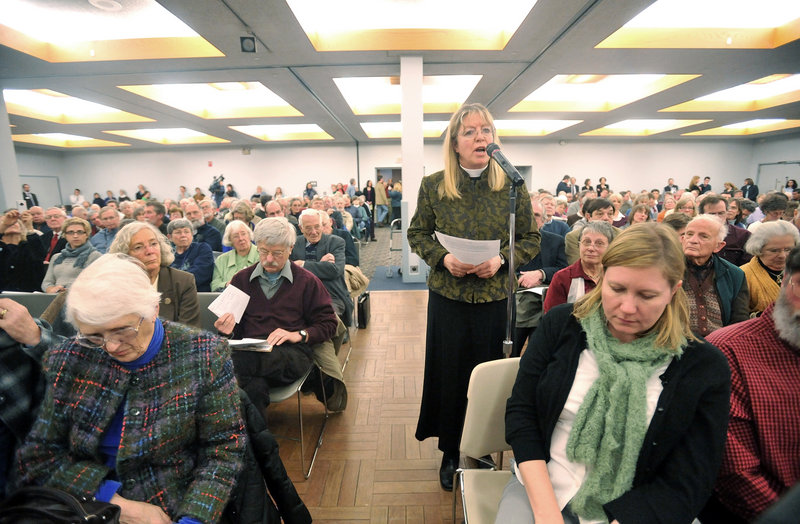AUGUSTA – Gov. Paul LePage listened Thursday as a series of speakers explained how environmental laws have been good for their lives, businesses and health. But he stopped short of reversing his pledge to roll back regulations that dampen economic development.
LePage spoke to the crowd of about 500 people who turned out for the Roundtable on Maine People and the Environment at the Augusta Civic Center.
He said he supports fishing, farming and forestry, but Maine, where the average per capita income is only 80 percent of the national average, needs economic development.
“The regulations we have are good, strong and needed, but we have forgotten to use common sense,” he said.
The forum was organized by the Natural Resources Council of Maine as a counterbalance to LePage’s series of 22 “red tape removal audits” with business leaders, at which comments have focused on rolling back environmental regulations.
Environmentalists have been on the defensive. Dozens of bills have been filed with the new Republican-led Legislature this session to abolish longstanding environmental laws such as the bottle bill, as well as the Land Use Regulation Commission.
LePage sent shudders through the environmental community during his campaign when he heavily criticized the Department of Environmental Protection, expressed skepticism about the benefits of wind power and questioned the existence of global warming.
He has done little to ease the concerns since taking office. This week, he announced that he supports weakening rules that protect vernal pools from development.
Thursday’s forum had the same format that was used for the Maine Business Roundtable in November, when LePage was governor-elect.
Twenty-eight participants read 90-second statements. The speakers included a logger, a doctor, a priest, an Indian chief and several Republican business owners.
Many of the speakers told LePage that Maine’s clean environment is essential for those who make their living in the woods or on the ocean.
“Without excellent water quality, 2,000 Maine clammers are out of business,” said Chad Coffin, president of the Maine Clammers Association.
Harry Dwyer, a logger from Fayette, said regulations have increased in response to expanded knowledge about development’s impact on the environment. He said he welcomes regulations that protect Maine’s forests as long as they are enforced fairly.
“I can’t work in the woods if there are no woods,” he said.
Glen Libby, a groundfisherman from Port Clyde, said fishing regulations are working, and overfished species have rebounded as a result.
“Stay the course on fishing regulations. We are not blaming anyone anymore, and we have stopped complaining,” Libby said.
Jeff Reardon of Manchester made a case for Maine’s brook trout and the thousands of fishermen who come to the state each year in pursuit of the cold-water sportfish.
“This is the epicenter for brook trout in the lower 48,” said Reardon, Maine brook trout project director for Trout Unlimited.
LePage spent much of the time taking notes.
During a brief speech, the governor said he objects to a rule that prohibits potato farmers from spraying pesticide without notifying neighbors 90 days in advance.
In fact, there is no such rule, which the Maine Organic Farmers and Gardeners Association pointed out to him after the forum.
LePage said Maine’s forests should be working forests, and the state must protect the deer herd, which is important for hunting.
He said he would like to protect the Maine brand when it comes to the state’s natural resources, because too many lobsters and trees wind up in Canada, where they are processed and resold back in Maine.
He also said he will challenge states with coal-burning plants that degrade Maine’s air quality.
LePage said he supports environmental laws that are based on science.
While some in the audience said it was good to hear how environmental regulation and economic development are linked, they said they aren’t sure anyone changed LePage’s perspective.
“I am hopeful he heard what we said. Actions will speak louder than words,” said Sam Saltonstall of Peaks Island, board president of Maine Interfaith Power and Light.
Staff Writer Beth Quimby can be contacted at 791-6363 or at:
bquimby@pressherald.com
Send questions/comments to the editors.





Success. Please wait for the page to reload. If the page does not reload within 5 seconds, please refresh the page.
Enter your email and password to access comments.
Hi, to comment on stories you must . This profile is in addition to your subscription and website login.
Already have a commenting profile? .
Invalid username/password.
Please check your email to confirm and complete your registration.
Only subscribers are eligible to post comments. Please subscribe or login first for digital access. Here’s why.
Use the form below to reset your password. When you've submitted your account email, we will send an email with a reset code.